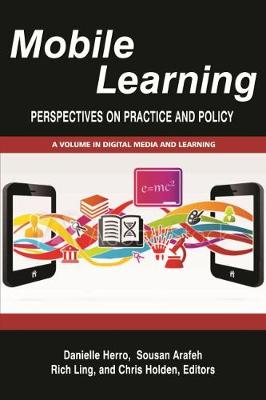Digital Media and Learning
1 total work
Mobile Learning
Published 5 February 2018
There can be no doubt that mobile technologies are here to stay. Global mobile traffic grew 74 percent in 2015 alone, with 563 million devices and connections added -- most of them tablets and Smartphones. This growth has been 4000-fold in the past 10 years and 400 million-fold in the past 15 years (Cisco, 2016). Mobile technologies permeate the lives of 21st century citizens as mainstays of organizational and institutional day-to-day operations, commerce, and communication and as tools used to support individuals' personal, social, and career responsibilities. In both the corporate and educational worlds, e- and m-learning and marketing with mobile technologies are moving forward at breakneck speed with, in many cases, a blurring of traditional sector boundaries.
As neither the technology nor the uses are static, exploring practices and policies that underpin this quickly shifting mobile technology context is crucial for ensuring its intelligent, purposeful, and equitable use. This edited book provides a venue for researchers to share their work on mobile learning with a focus on uses for mobiles in informal settings and PK-20 classrooms, language learning, mobile gaming, leadership and policy issues, and what mobile learning in the future may be. It assists researchers and educators to consider and answer questions such as: What is "mobilelearning" today? How can mobiles be used to enable learning? How is mobile learning crossing or connecting economic, social, and/or cultural sectors? How do specific cultural practices with media influence mobile learning (e.g., youth practices, educator practices, parent practices, community practices)? What are policy and leadership implications in supporting mobile learning? What policies, practices, and/or pedagogical approaches are necessary to move forward with mobiles in schools or universities? In what ways is mobile learning impacting education; including how students learn and teachers teach? What will/ should/might mobile learning look like in the future?
As neither the technology nor the uses are static, exploring practices and policies that underpin this quickly shifting mobile technology context is crucial for ensuring its intelligent, purposeful, and equitable use. This edited book provides a venue for researchers to share their work on mobile learning with a focus on uses for mobiles in informal settings and PK-20 classrooms, language learning, mobile gaming, leadership and policy issues, and what mobile learning in the future may be. It assists researchers and educators to consider and answer questions such as: What is "mobilelearning" today? How can mobiles be used to enable learning? How is mobile learning crossing or connecting economic, social, and/or cultural sectors? How do specific cultural practices with media influence mobile learning (e.g., youth practices, educator practices, parent practices, community practices)? What are policy and leadership implications in supporting mobile learning? What policies, practices, and/or pedagogical approaches are necessary to move forward with mobiles in schools or universities? In what ways is mobile learning impacting education; including how students learn and teachers teach? What will/ should/might mobile learning look like in the future?
